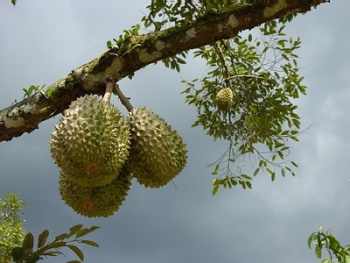Durian
From Wikiwel
Other names : D. zibethinus, D. dulcis, D. grandiflorus, D. graveolens, D. kutejensis, D. macrantha, D. oxleyanus, D. testudinarum, Civet Fruit, Stinkvrucht
Special Precautions of Durian
- Do not confuse with Soursop : Durian is a completely different fruit to the Soursop - not even related.
- Durian fruit, when combined with alcohol, can trigger side effects such as strong gastro spasms and explosive flatulence.
Benefits and uses of Durian are
- Good source of vitamin C - One cup of fresh durian (almost half a whole fruit) contains an impressive 47.9 milligrams of vitamin C, which is approximately 80 percent of our recommended daily intake (RDI). Aside from being an important antioxidant that guards us from degenerative diseases like cancer and Alzheimer's disease, vitamin C is also the key to the production of collagen, a protein that aids the growth of cells and blood vessels and which gives skin its strength and firmness. For this reason, vitamin C-rich fruits like durian also possess considerable anti-aging benefits.
- Natural aphrodisiac - Javanese culture has long considered durians to be potent aphrodisiacs, and emerging scientific research is starting to confirm these allegations. According to one 2009 study published in the Journal of Pharmacy Research, for example, mice that were fed durian extracts over an extended period experienced improved libido, and a higher sperm count, than the control group. The researchers attributed these benefits to the durian's large concentrations of glycoside, saponins, flavanoids and sterols, which are important phytonutrients that increase androgen levels in humans and animals.
- High in beneficial fats - Like avocados and coconuts, durians belong to that rare group of fruits that contain large amounts of fat and calories. Specifically, one cup of durian contains 13 grams of fat (20 percent of our RDI) and a whopping 357 calories. Sadly, these facts often discourage people from eating or even trying durians since they believe they will cause weight gain and high cholesterol. In reality, however, the fats found in durians are the heart-boosting monosaturated kind that lower "bad" LDL cholesterol, and - as with other calorific fruits - weight gain is usually caused by excessive consumption of them (eating a whole durian in one sitting, for instance, probably isn't a good idea).
- Analgesic and antibiotic properties - Though most of the durian's health benefits lie in its flesh, studies have shown that its shell also contains healing properties when processed into an extract. For example, a 2010 study published in the Journal of Southern Medical University demonstrated that durian shell extracts could relieve coughing in mice. The extract also exhibited pain-killing and antibiotic properties, suggesting that durian extracts could make an excellent natural alternative to related allopathic drugs like Paracetamol and Amoxicillin.
- Due to the high levels of amino acid tryptophan, durian is known to alleviate anxiety, depression and insomnia.
- It is highly useful in lowering cholesterol.
- Bursting with nutrients - Durians are an excellent source of B vitamins, and are especially high in thiamin and vitamin B6. Additionally, one cup of durian contains varying amounts of iron, magnesium, phosphorus, potassium, zinc, copper and manganese, as well as 7 percent of our RDI of protein and 37 percent of our RDI of dietary fiber.
- Acts as a natural anti-depressant: Studies have proven that low levels of serotonin could actually trigger depression. Durian is naturally rich in Vitamin B6 which is essential for the production of serotonin. Hence, the intake of durian is advised to boost serotonin levels and thus, tide over depression.
- A good source of energy: 100 grams of this fruit satiates about 21% of the daily carbohydrate requirement. Being a rich source of carbohydrates, it is helpful in replenishing your energy levels.
- For healthy bones and teeth: The presence of calcium, potassium and B vitamins in significant amounts makes this fruit beneficial for maintaining healthy teeth and bones.
- Aids in delaying aging: Vitamin C is found in abundance in this fruit. Vitamin C is a powerful antioxidant that helps to keep the oxidative stress prompted by free radicals at bay. The lower the oxidative stress levels, the slower the aging process.
- For a healthy digestive system: The presence of dietary fiber in durian helps in easing bowel movement. This in turn keeps away constipation and improves the power of digestion. The presence of thiamin and niacin improves appetite as well as digestive power, thus ensuring that your digestive system stays healthy.
- Maintaining blood sugar levels: The presence of manganese in desired levels aids in the regulation and maintenance of blood sugar levels. Hence, it can be relished by diabetics without any fear.
- Maintaining blood pressure levels: Durian is a good source of potassium which is required to keep the sodium levels of the human body intact. Regular intake of this fruit can thus ward off hypertension and associated medical conditions.
- Beneficial for Anaemic patients: Folate, if not present in adequate quantities, could lower the amount of red blood cells produced. This in turn can trigger anaemia. Durian is a good source of folate along with copper and iron. Hence, anaemic patients can tap the power of this fruit to overcome the health condition.
- Helps to prevent cardiovascular diseases: The presence of organosulfur helps it to regulate the inflammatory enzymes. Hence, it has the potential to keep cardiovascular diseases away.
- For a better libido: Durian is known to enhance libido. Thus, it helps in revitalizing your sexual life.
